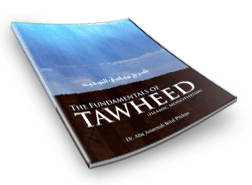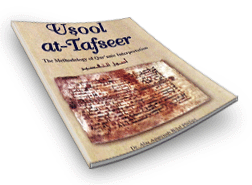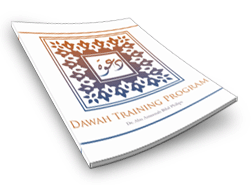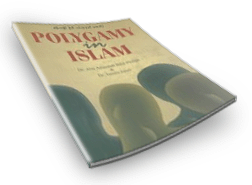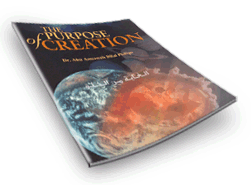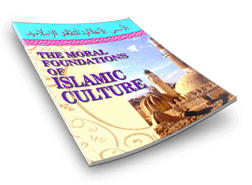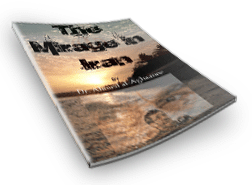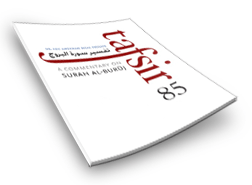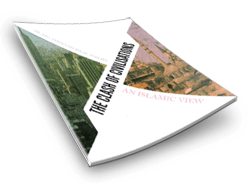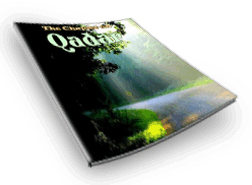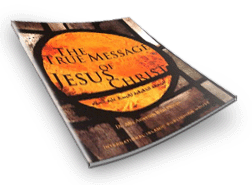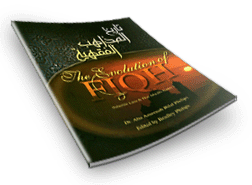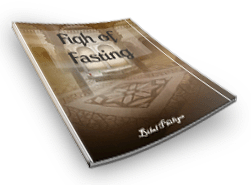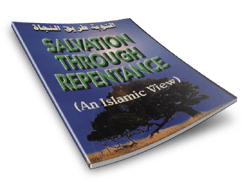Bilal Philips

In the Name of Allâh, the Most Beneficent, the Most Merciful
Abu Ameenah Bilal Philips was born in Jamaica, but grew up in Canada, where he accepted Islam in 1972. He completed a diploma in Arabic, and a B.A. from the College of Islamic Disciplines (Usool Ad-Deen) at the Islamic Univeristy of Madeenah in 1979. At the University of Riyadh, College of Education, he completed a M.A. in Islamic Theology in 1985, and in the department of Islamic Studies at the University of Wales, he completed a Ph.D. in Islamic Theology in 1994. Since 1994 he has founded and directed the Islamic Information Center in Dubai, United Arab Emirates (which is now known as Discover Islam) and the Foreign Literature Department of Dar Al Fatah Islamic Press in Sharjah, UAE. Presently, he is a lecturer of Arabic and Islamic Studies at the American University in Dubai and Ajman University in Ajman, UAE. e-mail: [email protected]
The Fundamentals of Tawheed (Islamic Monotheism)
Dr. Abu Ameenah Bilal Phillips This book presents a detailed explanation of the classical Islamic concept of God's unity as it relates to faith and acts of religious devotion. It also discusses the major areas within which the Islamic unitarian belief (Tawheed) is either nullified or compromised by idolatrous concepts and practises, collectively called Shirk |
|
Usool at-Tafseer
By Abu Ameena Bilal Philips. An Excellent Gift to Students of Islamic Sciences Literally translated 'The Fundamental Principles of Qur'aanic Interpretation,' this book refers to the branches of knowledge which are necessary to provide an accurate interpretation of the Qur'anic texts, such as Arabic grammar and syntax, Arabic literature and Qur'anic sciences ('uloom al-Qur'aan). Addressed topics include the Tafseer of the Qur'an, books of tafseer, translations of the Qur'an, Wahy ('divine revelation'), reasons for revelation, the differences between Makkan and Madinan revelations, Naskh, the Muhkam and Mutashaabih, and more. |
|
Usool Al-Hadeeth
By Abu Ameena Bilal Philips. The science of hadeeth terminology and assesment is a particularly difficult field of study. Dr. Bilal Philips has managed in this text to simplify this topic and to make it quite relevant to our times by addressing some of the most challenging questions raised by those who question the validity of hadeeth literature in general. |
Islamic Studies Book 1
This is the first book of a series of 5 primarily designed for high school (secondary) school students (ages 12-18). It focuses on four areas of Islamic knowledge: Aqeedah, Tafseer, Hadeeth and Fiqh and is presented in simple language. It is also suitable for new-Muslims and adults seeking an easy explanation of the basic areas of Islamic disciplines. All texts are supported by evidence from the Quran and authentic hadeeths. |
|
Dawah Training Course
By Dr. Bilal Philips All of us interct with people to some degree or another. The Dawah Training Program by Dr. Bilal Philips gives us the tools we need to turn our interactions into fruitful oportunities for dawah. Starting from the legal ruling of Dawah and taking us through various Dawah techniques, Dr. Bilal Philips presents a comprehensive course enlightening the listener to the appropriate means and methodology of presenting the beautiful religion of Islam to people from various backgrounds. |
Funeral Rites In Islam
Abu Ameenah Bilal Philips The purpose of this book is to provide English speaking Muslims a concise and authentic compilation of the instructions regarding funeral rites in Islam. |
|
Polygamy In Islam
Abu Ameenah Bilal Philips & Jameelah Jones 'Polygamy is the Muslim practice most frequently and severely maligned by Westerners and modernist Muslims. This book can be read with profit by all unprejudiced readers who wish to know its justification and rationale. One of the greatest contrasts between Islam and the West is their conflicting concepts of relations between the sexes. Indeed, the very first question a Muslim convert is confronted with by an American or European is ?Why does Islam allow four wives?? This book...replies straightforwardly to that question and much more. The authors describe all the most important characteristics of marriage in Islam, pointing out that the Western notions of sex equality and romantic premarital ?love? are not necessary in Islamic marriage based on piety and the commitment on the part of both parents to win the pleasure of Almighty Allah.' This book contains basic guides for anyone interested in understanding the rights and obligations of males and females in Islamic plural marriage. The guidelines have been drawn from the Quran, Hadith and opinions of Islamic scholars.
|
Islam is Your Birthright
Majed S. Al-Rassi. Edited by Dr. Bilal Philips Is it necessary to adopt a religion? What is the criteria to judge a religion? How to differentiate between a false and a true religion? How to check the pure teachings of a religion? These are the vital questions that arise in the mind of a person when he looks upon the religions for a critical study. So, which religion is the right one and how can the seeker of truth know it? This is the subject of this booklet. |
The Purpose of Creation
About the Book: Addresses the fundamental question of existence: “Why are we here?” Compares the answers of various scriptures and philosophies and ends with a details discussion of the Islamic answer. The purpose of creation is a topic that puzzles every human being at some point in his or her lifetime. Everybody at some time or another asks themselves the question “Why do I exist?” or “For what purpose am I here on earth?” |
The Moral Foundations of Islamic Culture
It is important to understand Islam from a cultural point of view because the basis of much of the current turmoil within Muslim countries and conflict with their neighbors can be attributed to cultural clashes. Dr. Abu Ameenah Bilal Philips was born in Jamaica, West Indies, but grew up in Canada, where he accepted Islam in 1972. He completed a B.A. from the College of Islamic Disciplines (Usool ad-Deen) at the Islamic University of Madeenah in 1979 and an M.A. in Islamic Theology in 1985 at the University of Riyadh, College of Education. In 1994 he completed a Ph.D. in Islamic Theology in the department of Islamic Studies at the University of Wales. Since 1994 he has founded and directed the Islamic Information Center in Dubai, United Arab Emirates (which is known as Discover Islam) and the Foreign Literature Department of Dar al Fatah Islamic Press in Sharjah, UEA. In the year 2001, Dr. Bilal established the first accredited Islamic University on the Internet called Islamic Online University (http://www.bilalphilips.com/iou). He was a professor of Arabic and Islamic Studies at the American University in Dubai and Ajman University and is currently the head of the Department of Islamic Studies at the Preston University Ajman. |
The Mirage in Iran
By Dr. Ahmad Al-Afghanee TR: Bilal Philips
|
|
A Commentary on Surah Al-Buruj
Author: Bilal Philips | Pages: 90 | Size: 2 MB This is a summary around the compilation of the Quran. The Qur'an Consists of many lessons and parables for people to obtain lessons and draw strength from. Surah Buruj contains one of the most beautiful stories of steadfastness and patience in the face of adversity; a universal lesson applicable to all. A step by step analysis of each verse drawing upon different sources . The author brings out the great relevance of the Quran to our lives and to occurrences/events in the modern world. |
|
The Three Shelters
By Bilal Philips. Commentaries on Soorahs al-Ikhlaas, al-Falaq and an-Naas. This Tafseer contains a far greater depth of understanding due to the number of other classical and contemporary commentaries used like al-Qurtubees al-Jaami li Ahkaam al-Quraan, Ibn al-Qayyims Compilations, ash-Shawkaanees Fath al-Qadeer, ash-Shanqeetees Adwaa ul-Bayaan, as-Sadees Tayseer al-Kareem ar-Rahmaan, and Al Uthaymeenes Tafseer al-Quraan al-Kareem. |
|
The Clash of Civilisations
Author: Bilal Philips | Pages: 152 | Size: 4 MB In a time when Muslims in the West live in an environment of turmoil and difficulty facing new challenges daily, they encounter a cultural dilemma, a clash of the Islamic and Western civilisations. Therefore, it is of the utmost importance to know the foundations of these cultures, the differences between them as well as understanding Islam correctly taken from its pure sources. In this book, the author highlights these aspects of the two cultures whilst also giving a detailed explanation of the core beliefs of Islam. |
|
Garments of Love & Mercy | Fiqh of Marriage
The Fiqh Of Marriage course is a course delivered by Dr. Aboo Ameenah Bilal Philips, based on the Marriage Series by Dr. Muhammad al - Jibaaly. The main goal of this course is to understand what Islaam says about Marriage and the Rules and Regulations related to it. |
|
Qadar (Predestination)
Qadar is a very sensitive topic. It is the sixth pillar of faith, and many people have gone astray regarding it. Some have denied it altogether while others have gone to such extremes in affirming it that they end up denying human free will. The truth as elucidated in Islamic teachings is between these two extremes. In dealing with this topic in his book A‘laam as-Sunnah al-Manshoorah, Shaikh Al-Hakami has extracted from the works of the early scholars the majority of the most important points which must be grasped in order to have a correct understanding. His mode of presentation is the Q&A style, as it was designed as a concise teaching text, whose main body was easily memorized. The commentary represents a brief elucidation of some of the more difficult points through the addition of useful material from other classical texts like that of al-‘Aqeedah at-Tahaawiyyah as well as modern texts like Dr. Saleh’s compilation The Salaf’s Guide to the Understanding of Al-Qadaa wal-Qadar. |
The True Message of Jesus Christ
Dr. Abu Ameenah Bilal Philips Published by Dar Al Fatah in 1996 Description An analytic look at Jesus' person and the content of his message. Examines Christian sources historically and textually and compares them with the Islamic point of view as found in the Quran and Sunnah. |
The Evolution of Fiqh (Islamic Law & The madh-abs)
By Dr Abu ameenah Bilal Philips. The origin of Islamic law and its evolution and the four schools of law (math-habs) are discussed in this work along with the reasons for differences among them. This is probably Bilal Philips best-selling work on the various schools of thought in Islam, including detailed facts, insight, and commentary on the four major madhabs as well as other, less-known madhabs in Islam. Includes mini-biographies on various eminent Islamic scholars the Evolution of Fiqh (Islamic Law & the Madh-habs), the author very clearly presents a brief overview of the historical development of Islamic law and its schools (the Madh-Nabs). The book identifies the main reason for the appearance of the Madh-habs and the factors leading to differences among them. For those to whom the Madh-habs have been a mystery, this aspect of the book will he extremely enlightening. Although the author sheds light on both the positive and negative roles of the Madh-habs in the past, the main message of the book is call to the understanding the differences (with an aim to remove them where possible) |
|
Fiqh of Fasting
By Bilal Philips. The prescribed book for the course is Subulus-Salaam by the 17th century Yemenite scholar Muhammad ibn Ismaaeel as-Sanaanee which is a commentary on Buloogh al-Maraam written by Haafiz Ibn Hajar al-Asqalaanee. In Buloogh the author gathered the majority of the hadeeths which are commonly used as the basic evidences for the Islaamic legal system. The course material is comprised of the Chapter on Fasting (Kitaab as-Siyaam) from Subulus-Salaam. |
Salvation Through Repentance
This book clearly and concisely presents the Islamic concept of Tawbah (repentance) and its viewpoint wherein salvation by faith and salvation by deeds are combined in a truly unique manner. A book that is relevant to every Muslim. |
